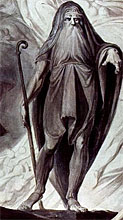People who claimed special knowledge of the divine or
supernatural realms have appeared in many myths, legends, folktales, and religious traditions. Those known as seers could see things hidden from others. They had the ability to predict the future or speak for the gods. Others with similar magical gifts have been called diviners,
oracles, prophets, and
shamans. They are said to have received special wisdom, power, or understanding from
deities or spirits, and they have generally had a significant role in religion.
Seers have used various techniques of
divination. In the ancient world, Babylonian*, Egyptian, and Greek seers often relied on the interpretation of dreams to predict the future, believing dreams to be messages or warnings from the gods. Seers and diviners also explained the significance of events thought to be
omens. Oracles, such as the famous oracle of Apollo* at Delphi in ancient Greece, were often associated with a particular temple or shrine. They asked questions of the gods on behalf of worshipers or pilgrims and then gave the gods' answers.
Some seers, claiming to be divinely inspired, spoke on a wide range of issues. In the ancient Near East, prophets and diviners frequently became involved in politics. Hebrew prophets such as Samuel, Elijah, and Amos did not merely foretell the future. They also gave their views on religious practices and social conditions that they believed were wrong.
Several seers mentioned in Greek myths were associated with Apollo. Mopsus, a seer who took part in the quest for the Golden Fleece*, was sometimes said to be a son of Apollo. The seer Laocoon was a priest of Apollo until he broke his vow by fathering children. The best-known seer of Greek mythology was Tiresias, who had been blinded by the gods. According to some stories, Zeus* gave him the power of
prophecy to make up for his loss of sight.
The Druids, priests of an ancient Celtic* religion, were said to be seers and magicians. Like the prophets of the ancient Near East, they sometimes held political power as advisers to rulers. The Druid Cathbadh, who advised King Conchobhar of Ulster in Ireland, foresaw the destruction of the kingdom. Druidic ceremonies of divination included human and animal sacrifice.
In Norse* mythology, the seer Mimir guarded a sacred spring at a root of the World Tree, Yggdrasill. Odin* gained magical knowledge by drinking from the spring, but he had to pay for it by giving one of his eyes to Mimir. The Norse goddess Freyja was also a seer. She introduced the gods to the type of divination called
seid, which involved going into a trance and answering questions about the future.
Tiresias a blind seer from greek mythology:

Seers have also been featured on the television show Once Upon a Time:







 Moved from: Mythical Creatures and Beasts
- Pelagios
Moved from: Mythical Creatures and Beasts
- Pelagios